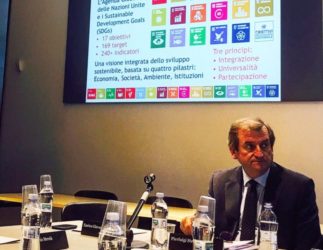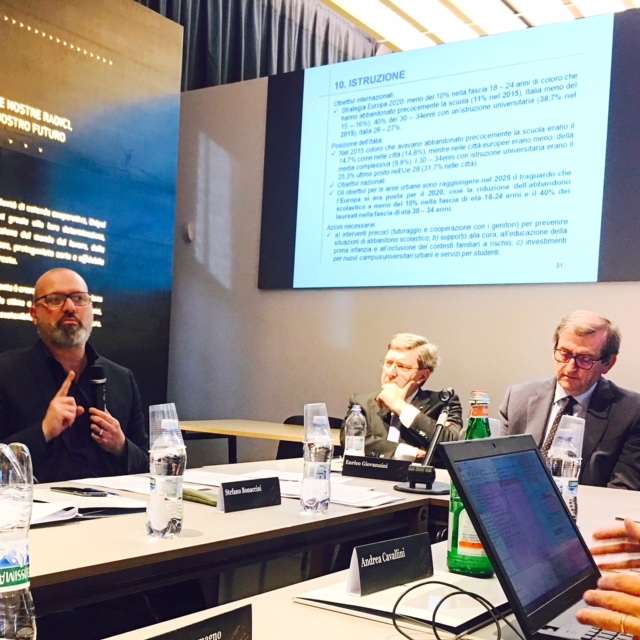 My commitment joins the one of ASviS, the Italian Alliance for a Sustainable Development. The meeting with theme Cities, Infrastructures, Social Capital took place on 3rd of April at the presence of Pierluigi Stefanini, ASviS President, and Enrico Giovannini, ASviS Spokesperson. Every participant represented an Association adhering to the Alliance: they were all in agreement with the support and the sharing of the objectives of the 2030 Agenda and some of them also speak and deepen their goals.
My commitment joins the one of ASviS, the Italian Alliance for a Sustainable Development. The meeting with theme Cities, Infrastructures, Social Capital took place on 3rd of April at the presence of Pierluigi Stefanini, ASviS President, and Enrico Giovannini, ASviS Spokesperson. Every participant represented an Association adhering to the Alliance: they were all in agreement with the support and the sharing of the objectives of the 2030 Agenda and some of them also speak and deepen their goals.
The City
Civilization is a cultural structure of significance with the capability to unite and associate people in its common sharing. The city has always been a representation of the physical and symbolical place where civilization had the opportunity of a self development by accepting common meanings: these ones were built through exchanges, communication and mutual comparison. Cities have intensely scattered across continental Europe: starting from ancient times, the cultural development contributed and was, at the same time, the result of the foundation of urban areas. These are centres where humanity strongly expresses its innovation, connection and creativity. The same ones involved in the identity of Europe.
The European Policy
Being one of the most urbanized of the world, our continent is characterized by a particular structure and nature at the same time. Even though cities deeply shape the geography of Europe, its urban development is at risk: this fact is due to the effect of economic, human and demographic changes. Considering this scenery, the European Commission established a national ordinary policy of cohesion and coordination following the principle of subsidiarity: the aim of the 2014-2020 Urban Agenda is to change the present dangers into new opportunities. In order to complete the political guidelines here solicited, interventions for employment, poverty, homes, soil, environment, circular economy, energy, mobility, air, education are also included. These fields are all in orbital connection with the city, according to a typically humanistic perspective.
Italy and Non-Sustainability
Particularly, in our Country sustainability is inadequate: the main reasons for this are the absence of a systemic vision, a legislation and univocal strategies. The Commission arranged an educational national programme on sustainable development (realized through a network of universities, initiatives in the schools, touristic sustainability) aiming at positive results in the fields of poverty and inequality, circular economy, innovation and work, cities, infrastructure and social capital: specifically, defending the soil from an excessive consumption prevents the risks of climatic calamities.  In this respect, Stefano Bonaccini, President of the Emilia-Romagna Region, indicated the quality of territories and the importance of a territorial development as working themes as well as the fields of manufactures, culture and tourism: the great challenge has still remained finding an integration among these variables and between public and private, giving also attention to the active participation of local citizens.
In this respect, Stefano Bonaccini, President of the Emilia-Romagna Region, indicated the quality of territories and the importance of a territorial development as working themes as well as the fields of manufactures, culture and tourism: the great challenge has still remained finding an integration among these variables and between public and private, giving also attention to the active participation of local citizens.
Cities and Sustainability
The attention to the urban dimension is fully in compliance with the sustainable economic model: the evolution process starts from the valorization of the micro dimension (with a simplier complexity) and reaches the macro dimension (with more complexity). Therefore, the city represents the smallest dimension where society can still find a self identity as a community aggregation: only at this level values such as harmony, cohesion, shared culture and awareness can be possible. Moreover, the programmed governance directions follow the goal 11 of the 2030 ONU agenda for a sustainable development: they will have the capability to change cities and their habitations into inclusive, safe, durable and sustainable realities.
Our participation
We decided to participate actively and to ideally sustain the valorization of the cultural and natural European and national heritage. In fact, cities are the symbolic centre preserving the meaning and the awareness of each territory and of its people: the urban dimension is the one where civilization fully expresses its communicable and shared identity. When we talk about sustainability, first of all we consider the city: the safeguard of each territory and its culture inaugurates the sustainable economic model.
RIVOLUZIONE EVOLUZIONE
La transizione a modelli di business sostenibili è solo questione di tempo. Le organizzazioni, le imprese e le pubbliche amministrazioni che scelgono già da ora